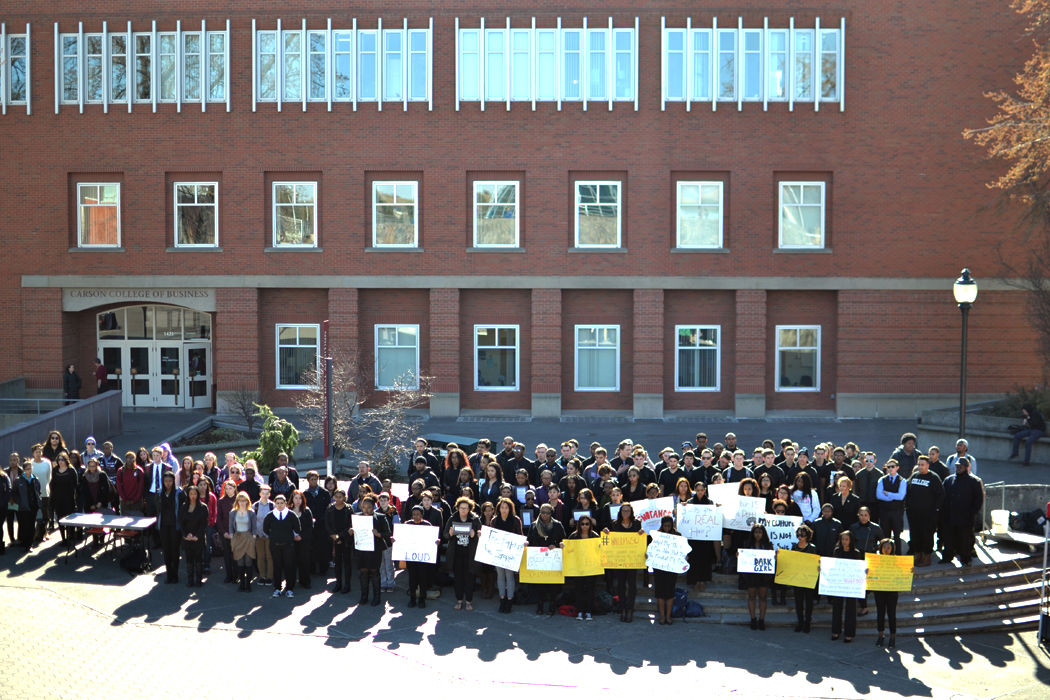WSU working to update free speech policies
March 2, 2016
“Free Speech Zones,” a term that has haunted WSU’s reputation with the First Amendment, may be a thing of the past by the next academic year.
WSU student government and faculty, along with members of the state legislature, are working to revise the university’s free speech policies; an action members of all involved parties admit is long overdue.
“We should be able to speak freely,” said Emily Strode, ASWSU executive director of legislative affairs. “That’s kind of the point of a university is to share ideas openly with one another, and be able to debate that. It’s a fundamental right that we have.”
The university’s current free speech codes, which WSU Police Chief Bill Gardner said could almost be classified as archaic, dictate that students who wish to protest or assemble on campus must give WSU a 14-days’ notice, and gatherings must be kept to the Glenn Terrell Mall or sidewalks next to public roads.
Policy makers also raised concerns about the guideline’s wording on permission and timing of protests.
This is the law that is on the books, but both Gardner and Strode said there is dissonance between what’s on the books and what is enforced.
“In every case since I’ve been here (eight years) the requests were so reasonable that there was never any issue of permission or timing, it was just a matter of doing it,” Gardner said. “The key to protests in any world, on-campus or off, is coordinating and making sure we all know where we’re at.”
For the sake of putting the school’s free speech legislation on par with the rest of the state’s universities, Strode and Gardner said the proposed rule changes would get rid of harsh restrictions on where students can assemble and the infamous two-week waiting period.
“If something happens over the weekend, on Monday you want to be protesting it,” Gardner said. “You don’t have time to make any kind of arrangements. So our policy is set up for students to be able to act immediately.”
The hope for policy-makers is that a proposal to change WSU’s codes will be on the Board of Regents’ meeting agenda by May so the new rules can officially go into effect for the next school year.
The challenge with making that deadline, however, is striking a balance between students’ rights to free speech and the interests of university stakeholders, Gardner said. The biggest threats to university employees and stakeholders usually don’t come from student groups, which will likely mean restrictions on non-WSU-affiliated persons will remain fairly tight.
“I think the university’s draft, when they present it to the regents, will be student-friendly,” Gardner said. “I think there’s provisions in there to protect research and the ability for us to continue our mission of educating students and conducting research, but also allowing students to express themselves.”
WSU’s current free speech policy caused some action in the state House of Representatives this legislative session. In January, Rep. Matt Manweller, R-Ellensburg, drafted and proposed a bill that would implement a statewide “academic Bill of Rights” for public universities.
The bill’s primary selling point was its free speech section, which posited that public universities should be traditional public forums, meaning free speech cannot be regulated at them.
“Washington State University is a public university, the whole campus is a free speech zone, just as the entire United States is a free speech zone,” Manweller said.
That bill is dead now, at least for this short legislative session, and, as pointed out by Rep. Drew Hansen, D-Bainbridge Island and chairman of the subcommittee for higher education, the bill was far too broad to make it through the house, as it also included sections on trigger warnings, microaggressions and due process in student conduct cases.
Current university students and faculty members, who didn’t want a statewide code dictating their free speech policies, also raised concerns through house testimony.
“You’re not going to pass a bill that preempts every institution’s demonstration policies in order to solve the WSU problem, when WSU’s problem is already being solved,” Hansen said.
Hansen has helped shape the draft of the new free speech codes for WSU, Strode said.








